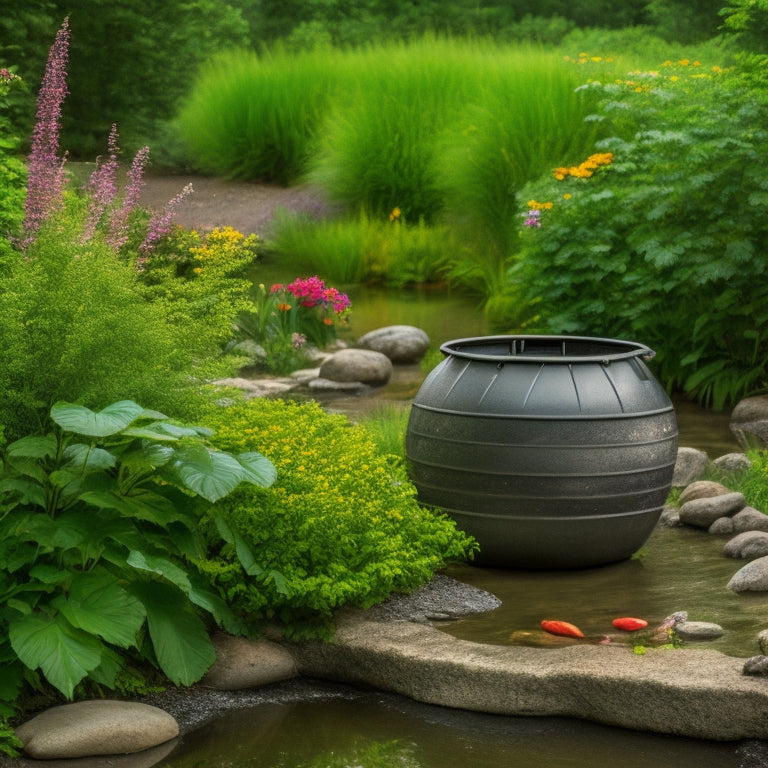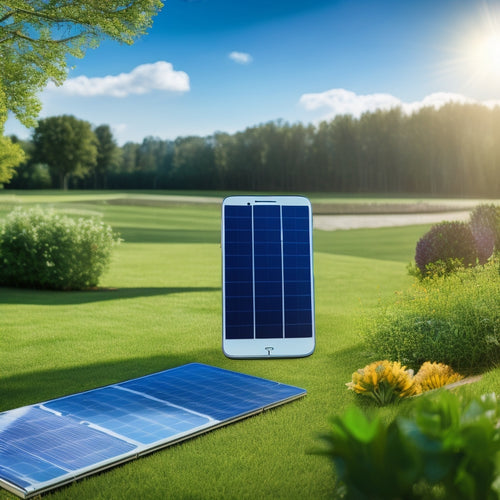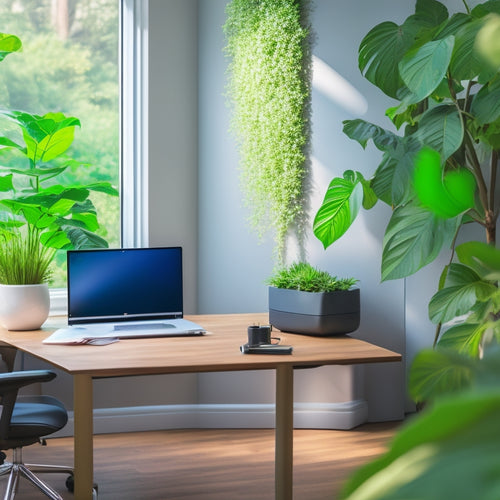
What Can Rainwater Do for Your Sustainable Yard?
Share
By utilizing rainwater, you can greatly reduce your water consumption costs, support local ecosystems, and create a thriving, sustainable yard. You'll nourish drought-tolerant plants easily, irrigate vegetable gardens efficiently, and wash cars and outdoor furniture without chemicals. Rainwater replenishes swimming pools naturally, cleans outdoor surfaces effectively, and supports local wildlife habitats. It also maintains healthy soil structure, reducing water bills and your carbon footprint. As you investigate the many benefits of rainwater, you'll uncover even more ways to enhance your sustainable yard and contribute to a more environmentally conscious community.
Key Takeaways
- Rainwater collection reduces water consumption costs and conserves potable water for non-essential uses, leading to significant utility bill savings.
- Harvested rainwater supports sustainable irrigation practices, ideal for drought-tolerant plants, and reduces municipal water consumption for gardens.
- Rainwater enhances soil health and structure by improving aeration, water-holding capacity, and microbial growth, promoting thriving plants and composting.
- Collecting and using rainwater alleviates pressure on local water resources, supports biodiversity, and creates natural habitats for local wildlife.
- Rainwater can be used for efficient pool maintenance, outdoor cleaning, and eco-friendly cleaning solutions, reducing chemical use and environmental strain.
Reduce Water Consumption Costs
By utilizing rainwater for your yard, you can greatly reduce your water consumption costs. Implementing water conservation strategies can lead to significant savings on your utility bills.
One effective cost-saving technique is to install a rainwater collection system, which collects and stores rainwater for non-potable uses such as irrigation and toilet flushing. This approach not only reduces your reliance on municipal water supplies but also decreases the amount of stormwater runoff that can pollute local waterways.
Additionally, incorporating green roofs and solar panels, like those found in eco-friendly highway stops, can also contribute to a sustainable yard.
Nourish Drought-Tolerant Plants Easily
Many drought-tolerant plants thrive in your sustainable yard, and rainwater makes it easy to nourish them. By using rainwater, you're providing these plants with the perfect amount of moisture, reducing the need for frequent watering. This allows you to focus on other aspects of your yard, enjoying the freedom to tend to your garden as you see fit.
Additionally, incorporating renewable energy solutions, such as solar panels renewable energy solutions, can further enhance your sustainable yard by reducing your carbon footprint. Rainwater helps with plant selection, allowing you to choose drought-tolerant plants that require less maintenance.
It enhances moisture retention in the soil, reducing evaporation and runoff. Rainwater also reduces the risk of overwatering, which can be detrimental to drought-tolerant plants. By using rainwater, you're creating a self-sustaining ecosystem that requires minimal intervention, giving you more freedom to enjoy your outdoor space.
Create Natural Ponds and Lakes
As you've optimized your yard for drought-tolerant plants, you can now turn your attention to creating natural ponds and lakes.
These water features not only add aesthetic value but also support ecosystem balance by providing natural habitats for local wildlife. By collecting and storing rainwater, you can fill your ponds and lakes, reducing your reliance on municipal water supplies.
Additionally, incorporating solar-powered energy systems, like those used in EV charging stations, can further reduce your carbon footprint and enhance energy independence.
This approach also helps maintain a healthy water cycle, as rainwater is allowed to percolate into the soil, recharging groundwater aquifers.
Irrigate Vegetable Gardens Efficiently
Collecting and storing rainwater in your sustainable yard provides an opportunity to irrigate your vegetable gardens efficiently, reducing your municipal water consumption and minimizing the risk of waterlogging.
By using rainwater, you can guarantee your vegetables receive the right amount of water, precisely when they need it. This approach also allows you to implement water-saving techniques like drip irrigation, which delivers water directly to the roots of plants, reducing evaporation and runoff.
As we shift to sustainable practices, reducing our carbon footprint reducing emissions is essential, and conserving water is a significant step in that direction. Furthermore, using rainwater can also reduce our reliance on fossil fuels, leading to energy independence and security.
- Reduce your water bill by using free rainwater
- Minimize the risk of waterborne diseases by avoiding contaminated municipal water
- Keep your soil healthy and fertile by avoiding chemical-treated municipal water
- Contribute to water conservation efforts and reduce your environmental footprint
Wash Cars and Outdoor Furniture
When you use rainwater to wash your car and outdoor furniture, you'll find that dirt removal is made easy, and the gentle water is less likely to strip away wax or damage surfaces.
Rainwater's neutral pH and lack of harsh chemicals also make it an ideal cleaning solution for delicate outdoor items. By using rainwater for washing, you'll reduce your reliance on potable water and minimize the amount of contaminants entering stormwater drains.
Additionally, using renewable energy sources, such as solar-powered charging, can further reduce your carbon footprint and energy costs.
Dirt Removal Made Easy
By utilizing rainwater, you can effortlessly wash away dirt and grime from your cars and outdoor furniture, giving them a fresh new look without wasting potable water. This not only saves you money on your water bill but also reduces your environmental footprint.
-
Rainwater is free from chemicals and minerals found in tap water, making it a gentler cleaning option for your belongings.
-
Collecting rainwater for washing also reduces stormwater runoff, decreasing the amount of pollutants that enter our waterways.
-
The water you collect can also be used for composting benefits, such as moistening your compost pile or creating nutrient-rich soil amendments.
- By collecting rainwater, you're taking a significant step towards a more sustainable and eco-friendly lifestyle.
Gentle on Surfaces Too
How gentle can you be on your car's finish and outdoor furniture's fabric when washing them? You want to keep them clean, but harsh chemicals and high-pressure washes can damage the surfaces. Rainwater is the perfect solution for gentle cleaning. It's free of harsh chemicals, minerals, and salts that can etch or discolor surfaces.
| Surface | Rainwater Benefit |
|---|---|
| Car finish | Protects from mineral deposits and etching |
| Outdoor furniture fabric | Gently cleans without fading or discoloring |
| Wooden decks | Won't strip natural oils or cause warping |
| Painted walls | No risk of damaging paint or causing color fade |
| Windows | Leaves no streaks or residue |
Flush Toilets and Run Appliances
Your home's plumbing system is one of the largest consumers of potable water, with toilets and appliances being significant contributors to this demand.
By utilizing rainwater, you can reduce your reliance on municipal water supplies and lower your water bill. Collecting and storing rainwater allows you to use it for toilet flushing and running appliances, reducing the strain on your plumbing system.
- Use rainwater for toilet flushing, reducing the amount of potable water needed for this purpose
- Increase appliance efficiency by supplying them with rainwater, reducing the energy needed to treat and transport potable water
- Reduce your water bill by decreasing your consumption of municipal water
- Contribute to a more sustainable future by conserving potable water for human consumption and other essential uses
Replenish Swimming Pools Naturally
You can maintain your swimming pool's water level naturally by utilizing rainwater, which also reduces the need for chemical treatments and minimizes water loss through evaporation.
By filtering rainwater, you can remove debris and contaminants, ensuring your pool water remains clean and clear.
During summer droughts, replenishing your pool with rainwater can be a breakthrough, saving you money and conserving this precious resource.
Pool Water Level Management
Approximately 10,000 gallons of water evaporate from a typical in-ground swimming pool each year, making pool water level management a crucial aspect of pool maintenance.
You can reduce your reliance on municipal water supplies and conserve this precious resource by harvesting rainwater for pool replenishment. This approach not only supports water conservation but also helps you save money on your water bill.
- Reduce water waste by monitoring your pool's water level regularly
- Install a rainwater harvesting system to collect and store rainwater for pool replenishment
- Use a pool cover to minimize evaporation when the pool isn't in use
- Automate your pool water level management system to maintain consistent water levels and prevent overflows
Rainwater Filteration Benefits
Rainwater filtration systems play an essential role in replenishing swimming pools naturally. By capturing rainwater through rainwater harvesting, you can reduce your reliance on municipal water supplies and lower your water bill.
Filtration systems remove debris, sediment, and contaminants from collected rainwater, making it safe for pool use. This not only conserves water but also reduces the amount of chemicals needed to maintain your pool's water quality.
With a properly installed filtration system, you can enjoy a sustainable and eco-friendly way to replenish your pool. By doing so, you'll contribute to a healthier environment and have more freedom to enjoy your outdoor space.
Summer Drought Relief
As summer droughts become increasingly common, pool owners are facing a formidable challenge: how to keep their pools filled without breaking the bank or straining local water resources.
You can replenish your pool naturally by utilizing rainwater, reducing your reliance on municipal water supplies and saving money on your water bill.
-
Collecting rainwater reduces the burden on local water resources, allowing you to maintain your pool without contributing to drought-related water restrictions.
-
Rainwater is free from chemicals and minerals found in tap water, which can damage your pool's lining or affect its pH levels.
-
Incorporating rainwater into your pool maintenance routine supports drought-resistant landscaping and rain garden design, creating a more sustainable outdoor space.
- By using rainwater, you're reducing your carbon footprint and contributing to a more environmentally conscious community.
Clean Outdoor Surfaces Effectively
With your outdoor spaces exposed to the elements, dirt, dust, and debris can quickly accumulate on surfaces, making them look dull and neglected.
By using rainwater for outdoor cleaning, you'll not only conserve potable water but also reduce your water bill. Collected rainwater is perfect for washing down driveways, sidewalks, and patios, as it's free of chemicals and minerals that can leave streaks or spots.
Plus, it's a natural and gentle way to clean outdoor furniture, grills, and other equipment.
Implementing a rainwater harvesting system allows you to store and employ rainwater for all your outdoor cleaning needs, making your yard look fresh and revitalized without straining the environment.
Support Local Wildlife Habitats
By incorporating rainwater into your outdoor cleaning routine, you've taken a significant step towards reducing your environmental footprint.
Now, you can further support local wildlife habitats by using rainwater in other ways. This not only helps conserve potable water but also creates a haven for native species.
-
Create native plantings that thrive with rainwater, providing food and shelter for local wildlife.
-
Design habitat corridors using rainwater-fed plants, connecting isolated habitats and promoting biodiversity.
-
Use rainwater to fill birdbaths, ponds, or other water features that attract wildlife.
- Reduce the amount of stormwater runoff, which can harm local ecosystems, by using rainwater for irrigation and other non-potable purposes.
Maintain Healthy Soil Structure
By using rainwater in your yard, you'll enhance soil aeration, allowing roots to breathe more easily and supporting healthy microbial growth.
This, in turn, improves water penetration, reducing runoff and ensuring your plants receive the right amount of moisture.
As you maintain healthy soil structure, you'll create a thriving environment that supports your yard's overall ecosystem.
Soil Aeration Boosted
Soil's water-holding capacity and structure rely heavily on aeration, which rainwater harvesting greatly enhances. By using rainwater, you'll create an environment that encourages healthy soil microorganisms.
These microorganisms break down organic matter, increasing the compost benefits and allowing your soil to breathe. This, in turn, promotes a well-balanced ecosystem.
-
Improved soil aeration allows roots to grow deeper, making them more resistant to drought and disease.
-
Oxygen-rich soil stimulates microbial activity, leading to a faster decomposition of organic matter.
-
Better aeration reduces soil compaction, allowing water and air to penetrate deeper into the soil profile.
- With rainwater, you'll reduce your reliance on chemical fertilizers, creating a more sustainable and self-sufficient gardening practice.
Water Penetration Improved
As you capture rainwater for your yard, you'll notice a significant improvement in water penetration, which is essential for maintaining healthy soil structure.
This is because rainwater doesn't contain chemicals or minerals that can impede water penetration, unlike municipal water. Improved water penetration allows your soil to absorb and retain water more efficiently, reducing runoff and increasing water retention.
This, in turn, helps to alleviate soil compaction, which can be detrimental to plant growth. By using rainwater, you'll create an environment where roots can grow deeper, and plants can thrive.
With better water penetration, your soil will become more resilient, and your yard will flourish as a result.
Frequently Asked Questions
Can I Use Rainwater for My Indoor Plumbing System?
Like a modern-day Archimedes, you're seeking innovative ways to utilize nature's resources. Yes, you can use rainwater for your indoor plumbing system, leveraging rainwater reuse to reduce your water bill and enjoy plumbing benefits like increased independence and a lower carbon footprint.
How Do I Ensure Rainwater Is Safe for Human Consumption?
You'll need to ascertain rainwater is safe for human consumption by implementing proper rainwater harvesting and safe storage techniques, including filtering, disinfecting, and regular testing to remove contaminants and bacteria.
Do I Need a Filtration System for Rainwater Collection?
You'll likely need a filtration system for rainwater collection, as untreated rainwater can contain contaminants. Investigate rainwater harvesting filtration options, such as sedimentation, UV treatment, or ceramic filters, to guarantee your collected water is safe and clean for use.
Can I Collect Rainwater in Areas With Heavy Pollution?
You can collect rainwater in areas with heavy pollution, but you'll need to take into account the pollution impact on your collection methods, using techniques like first flush devices or roof catchment designs to minimize contaminants and guarantee safe, clean water.
How Often Should I Clean My Rainwater Collection System?
As you're sipping morning coffee, coincidentally, the first spring shower hits, reminding you to clean your rainwater collection system; aim to do it every 3-6 months, or as needed, to guarantee ideal water quality and system maintenance.
Related Posts
-

3 Best Solar-Powered Biodegradable Accessories for Your Home
You're taking a significant step towards a more sustainable lifestyle by incorporating solar-powered biodegradable ac...
-

7 Best Solar Panel Upkeep Apps for Homeowners
You can optimize your solar panel's energy output and efficiency by up to 20% with regular maintenance, which is wher...
-

10 Best Energy-Efficient External Hard Drives for Sustainable Offices
When it comes to sustainable offices, you need external hard drives that balance data storage needs with energy effic...


